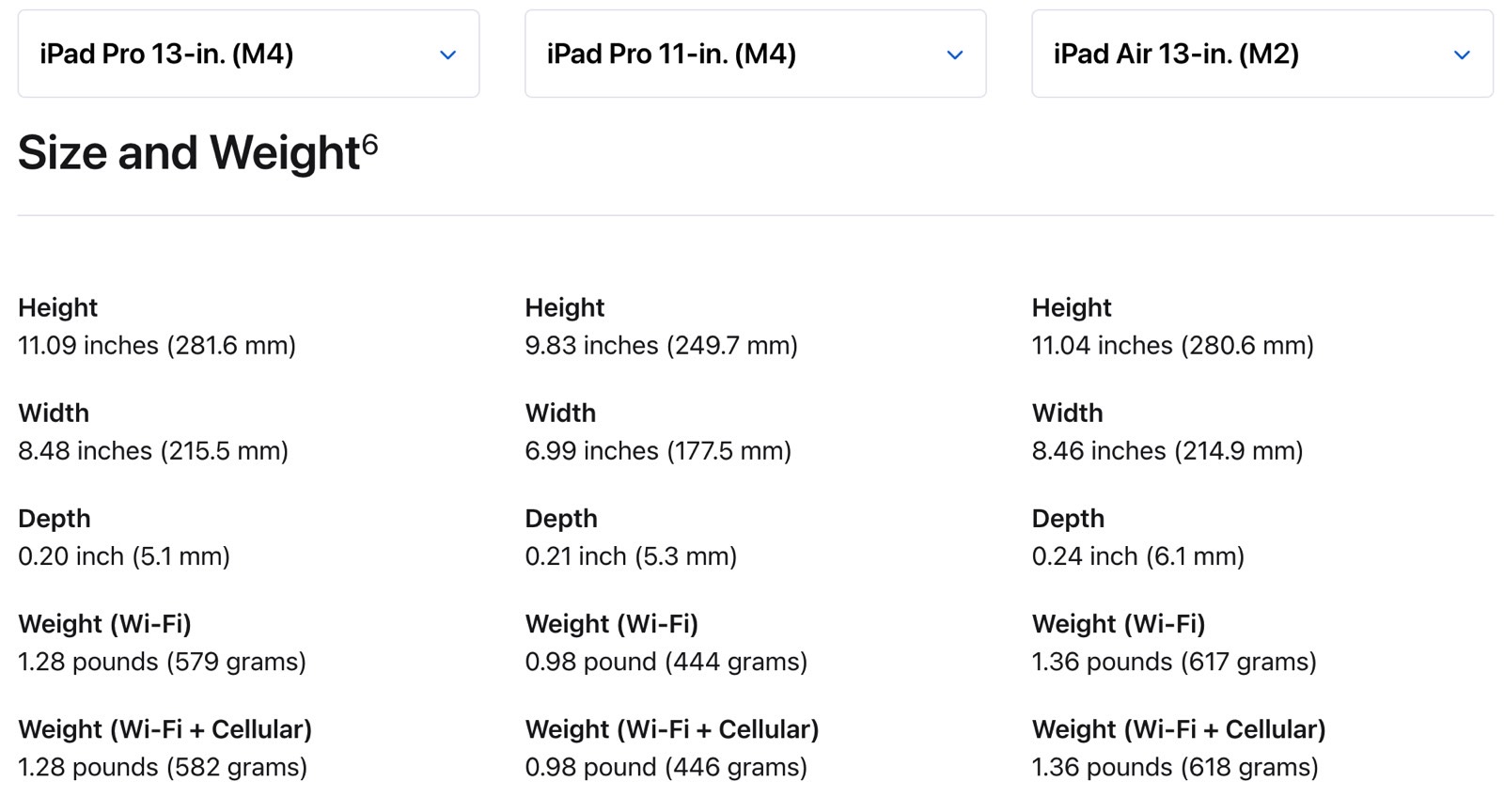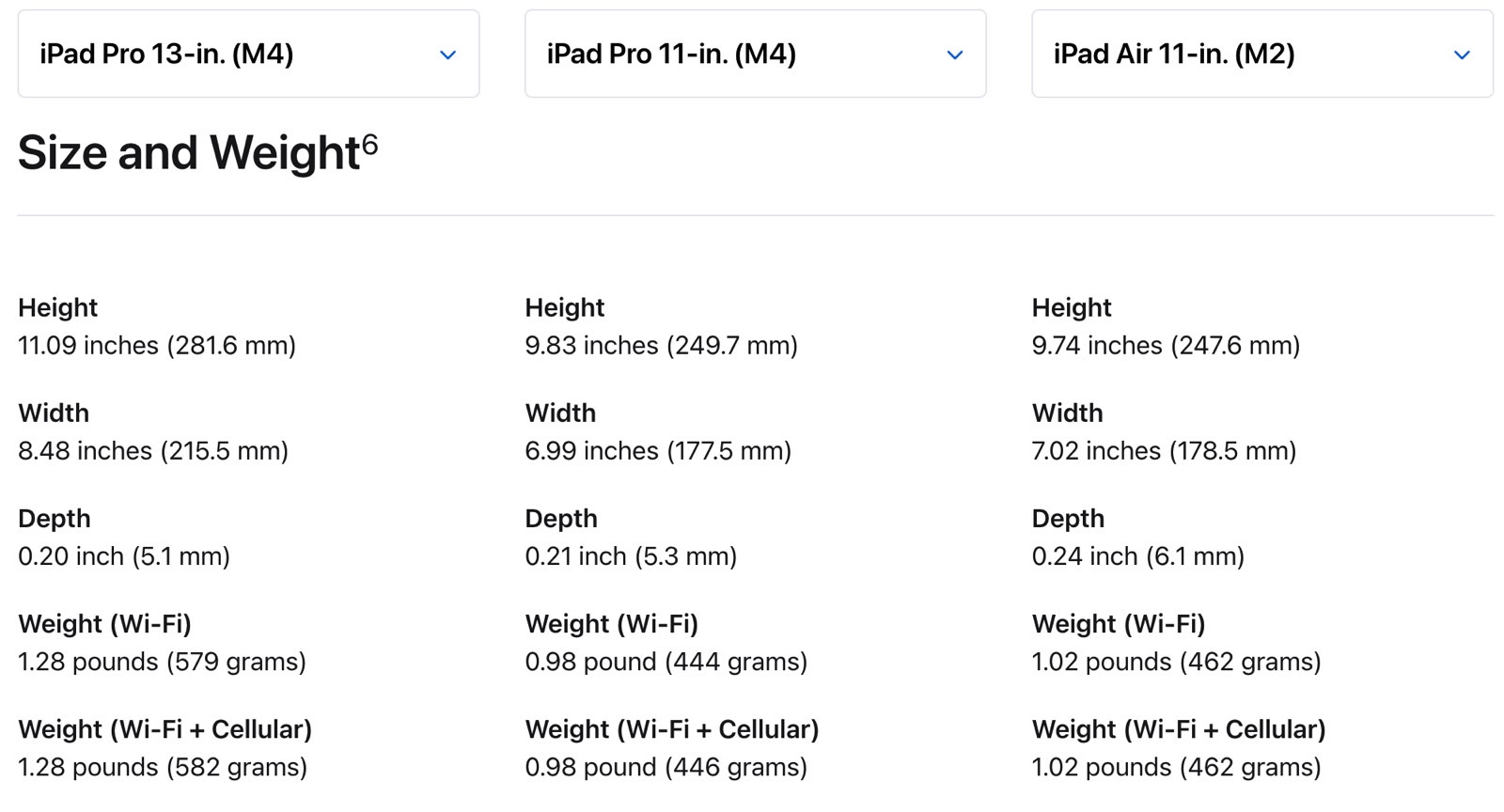Apple did not discuss the M4 iPad Pro’s battery life during the Let Loose event or address it in the press release. You have to go to the iPad Pro product page, where you find claims like, “M4 is built on second-generation 3-nanometer technology that’s even more power efficient and delivers all-day battery life,” which points to a footnote that explains how Apple tested battery life on the 2024 iPad Pros.
But Apple does offer more precise battery estimates in its iPad comparison tool. That’s where you’ll discover that the M4 iPad Pro battery life should be identical on the 11-inch and 13-inch models. Also, it matches the battery life of the iPad Air 6 and the previous iPad Pro models. That’s “up to 10 hours of surfing the web on Wi-Fi or watching video,” or “up to 9 hours of surfing the web using cellular data network.”
This might not seem like a big deal. After all, Apple hasn’t significantly upgraded the battery life of its devices in recent years. That’s what I thought initially, until I realized I was looking at this whole thing from the wrong perspective.
The M4 iPad Pros feature a massive chip upgrade. The M4 is not only more powerful than the M2, but also more efficient. Plus, the new Pro tablets pack a Tandem OLED display that will surely use plenty of energy to deliver that unrivaled screen experience with two layers of LEDs.
All of that happens in a much thinner case than any earlier models. The iPad Pros are even thinner than the new iPad Airs. That made me realize how massive the battery upgrade is.

“The new iPad Pro wouldn’t even be possible without M4,” Apple’s John Ternus said. “And despite its much thinner and lighter design, we’ve also substantially improved its thermal performance.” I pointed out this quote earlier this week as the Apple exec talked about the graphite sheets and copper in the Apple logo that keep the iPad Pro cool.
But I just realized how important this quote is for the M4 iPad Pro’s battery life.
The iPad Pro wouldn’t be possible without the M4 because the chip packs the new display engine that drives the Tandem OLED panel. The iPad Pro screen delivers 1600 nits of peak HDR brightness, 1000 nits of regular full-screen brightness, and a 2,000,000:1 contrast ratio. The M4 has to handle that.
The screen is thinner than ever, which makes the iPad Pro’s slim design possible. But the M4’s efficiency gains also allow Apple to manufacture a thinner tablet.
What I’m getting at is that by cutting the thickness, Apple reduced the iPad Pro’s battery size without decreasing battery life estimates. That’s crazy.

The 13-inch iPad Pro is just 5.1 mm thick, while the 11-inch model is slightly thicker at 5.3 mm. They weigh 579g and 444g, respectively.
The 13-inch iPad Air 6 is 6.1 mm thick and weighs 617g. The 11-inch model is also 6.1 mm thick and weighs 462g. These dimensions are almost the same as the 2022 iPad Pro models. The older 12.9-inch iPad Pro has a profile of 6.4 mm and weighs 682g. Finally, the old 11-inch model is slightly thinner at 5.9 mm, weighing 466g. Add 3-4g for the cellular models, as the dimensions apply to the Wi-Fi versions.
I said in the weeks leading to the M4 iPad Pro launch that I’m eying the 11-inch model. Size considerations were the priority here. I want a tablet that’s as light as possible in my hand and backpack. I have to say that Apple delivered everything I was hoping for, and then some. Even the 13-inch model seems like a good option right now.
But what’s amazing is that Apple reduced the size and weight of the iPad Pro while packing in much better tech than the 2022 model… all without impacting battery life. I don’t think people truly appreciate how crazy that is.








